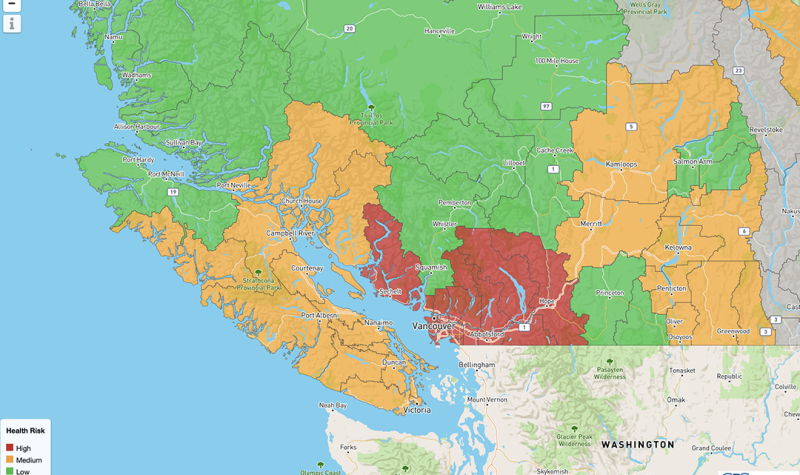A heat warning has been issued by Environment Canada for East Vancouver Island and the Sunshine Coast. Daytime highs are forecast to hover between 29°C to 32°C starting on Sunday with overnight lows of 17°C and 18°C.
The heat will also affect the Lower Mainland and Fraser Valley with temperatures reaching 33°C away from the water and could soar as high as 38°C in Lytton.
Temperatures are expected to return to seasonal values by Friday.
Dr. Shannon Waters, a medical health officer for Island Health, said that people need to get ready for the heat.
She recommends keeping your home cool by using air conditioning if you have it, drawing blinds or curtains over your windows or moving to basements that might have cooler temperatures. =
Dr. Waters recommends keeping an eye on how hot the inside of your home gets with a thermometer.
“If the temperature inside your home gets above 31°C you need to go somewhere else where it's cooler,” she said. “Sometimes at night that can actually be outside. Over this weekend if temperatures do get hot, good places to go are places where there’s shade, or to a lake, or by the ocean because those are generally places that are cooler.”
According to the British Columbia Heat Impacts Prediction System, most of Vancouver Island will be at a moderate risk to health while the Sunshine Coast and Lower Mainland are predicted to be at high risk.
Because of this, people need to be aware of the symptoms of heat stroke or heat exhaustion such as excessive sweating, dizziness, increased heart rate according to Dr. Waters.
“If you have someone who might be more susceptible to heat and you're noticing things such as they're feeling a bit dizzy or not making sense, looking a little bit confused, those are signs of something more serious happening and you need to get them to a cooler place and look at getting medical attention,” Dr. Waters said.
Dr. Waters also said that people who have mental health impacts and are on medication should be careful as their sensitivity and resilience to heat are decreased.
Lisa Brinkman, manager of community planning at the City of Nanaimo suggests cooling down in libraries, shopping malls, and lobbies of city recreation centres, or taking a dip in public swimming pools.
The City of Courtenay is offering free swimming in its outdoor pools in August as part of a pilot project approved by city council last month. There’s currently no plan in Nanaimo to make outdoor pools free of charge but the city just completed an extreme heat study and a final report is expected later this summer.
“The city has a lot of rivers and treed forest areas and kind of shaded waterfront areas that people tend to go to for cooling,” said Brinkman. “So cooling centers themselves weren't always identified as a priority through the research. That's where we find our vulnerable populations tend to go.”
For people in Nanaimo who are experiencing homelessness the city has partnered with local agencies to help them beat the heat and outreach teams will be distributing water bottles, sunscreen, hats, personal misters, cooling towels and shade tents according to Brinkman.
The city of Nanaimo’s water parks for kids and a misting station at Maffeo Sutton Park will be open and unaffected by the current water restrictions.
Nanaimo’s manager of water resources Mike Squire said in a statement that the Jump Lake Reservoir is 77 per cent full, which is nine per cent lower than average. The current Stage 3 watering restrictions that have been in place since early July has seen water consumption drop by 10 per cent for this time of year. Squire doesn’t see the city needing to move to Stage 4 restrictions but is monitoring the situation.
Dr. Waters stresses that while the heatwave is something people should take seriously, it’s not going to be the extreme heat that killed over 600 British Columnians in 2021, including six in Nanaimo.
“You're going to feel hotter temperatures than we've felt during the summer to date so far, but it's not going to be of the impact that we saw in 2021,” she said. “But it's still going to be important to find places to stay cool, to keep hydrated and to touch base with those who might be more impacted by the heat.”
For local information on how you can stay cool next week see your local government’s website.
Listen tio CHLY's report below:


